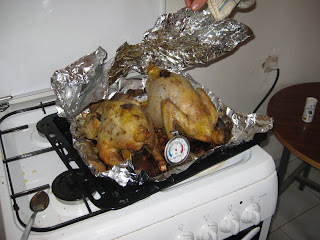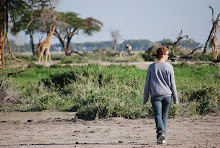 My celebration began the Sunday before Thanksgiving. I woke up early and began heating my dutch oven. My only method of baking here, you place a big pot on your stovetop with several empty tuna cans inside where you then place the item you are baking on top of the cans and close the pot with a lid. Sweet potato casserole, green bean casserole, stuffing, gravy, and even cans of turkey were each prepared one-at-a-time in my slow little MacGyver-ed oven.
My celebration began the Sunday before Thanksgiving. I woke up early and began heating my dutch oven. My only method of baking here, you place a big pot on your stovetop with several empty tuna cans inside where you then place the item you are baking on top of the cans and close the pot with a lid. Sweet potato casserole, green bean casserole, stuffing, gravy, and even cans of turkey were each prepared one-at-a-time in my slow little MacGyver-ed oven.I invited five friends to come over at 2pm, and by 1:30pm found my house as clean as it has ever been. My curtain was taken down to serve as a table cloth and candles were placed on the table set for six. I never knew my house could feel so homey. Coupled with the smell of my favorite foods and I was in heaven. Guests arrived somewhat on-time and I introduced each new dish to them and made them serve themselves (something that they are not used to). In Ethiopia you are typically served by the host, who scoops the food onto your plate, so serving your own food, and particularly going back for seconds and helping yourself, was something I had to force them to do. We each said what we were thankful for, and had a wonderful American meal together.
 My favorite discussion was having them comment on the similarities and differences of the holiday to Ethiopian holidays. The sweet potato to them looked with a thick local wat, shiro tegabeno. The gravy looked like its thinner version, shiro fesis. And the stuffing I realized, as I told them about how it was made, is like a local wat, dabbo ferfer, which consists of torn up bread and spices. It was very entertaining to hear them compare the foods and cultures. They also added that the only two things this holiday needed to become Ethiopian are coffee and injera!
My favorite discussion was having them comment on the similarities and differences of the holiday to Ethiopian holidays. The sweet potato to them looked with a thick local wat, shiro tegabeno. The gravy looked like its thinner version, shiro fesis. And the stuffing I realized, as I told them about how it was made, is like a local wat, dabbo ferfer, which consists of torn up bread and spices. It was very entertaining to hear them compare the foods and cultures. They also added that the only two things this holiday needed to become Ethiopian are coffee and injera! My real holiday was celebrated in Bahir Dar surrounded by Americans, some Europeans, and a few Ethiopian friends. Chickens were cooked (bought live at the market the day before), pies were baked, and all the fixins’ were in attendance. It was definitely a celebration to be thankful for. Both communities, Ethiopians in Dangila, and foreigners in surrounding towns are wonderful support groups. While making the feast wasn’t quite as easy as going to the local supermarket and buying everything for the occasion, the additional work added to the enjoyment. I am so grateful for this support system in country and my support system holding me together from across the globe. Thank you.
My real holiday was celebrated in Bahir Dar surrounded by Americans, some Europeans, and a few Ethiopian friends. Chickens were cooked (bought live at the market the day before), pies were baked, and all the fixins’ were in attendance. It was definitely a celebration to be thankful for. Both communities, Ethiopians in Dangila, and foreigners in surrounding towns are wonderful support groups. While making the feast wasn’t quite as easy as going to the local supermarket and buying everything for the occasion, the additional work added to the enjoyment. I am so grateful for this support system in country and my support system holding me together from across the globe. Thank you.












